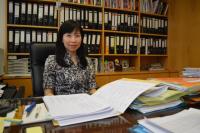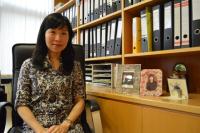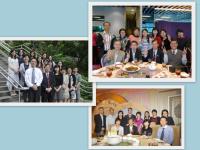1. Why did you join the University?
Before joining CUHK, I worked for an accounting firm and was involved in auditing for the University. I became attracted to the beautiful campus environment, the uncomplicated human relationship and the job stability. In an open recruitment, I was offered the job, which allowed me to work for the Bursary. What is more, I believe the University attaches great importance to the humanistic spirit and takes it upon herself the responsibility to teach students the significance of human values and that of good citizenship and leadership. I fully support this principle.
2. What is your most memorable experience in CUHK?
My most memorable experience was gained when the University Grants Committee slashed funding for the higher education institutions in 2004. In response to this, the University established a "task force" to deal with the difficult issue, and I was assigned the secretary role of the group. Under the leadership of the Vice-Chancellor and Pro-Vice-Chancellors, we held numerous meetings and consultations in face of the unprecedented "funding cuts". This was indeed a very valuable experience. Under the impact of "funding cuts", the University faced large deficits for four consecutive years. Only in recent years was funding increased, thanks to the "334" curriculum, and the financial situation of CUHK became stabilized.
3. When colleagues encounter a difference of opinion at work, how would you deal with the situation?
I think the secret to solve the problem is: colleagues need face-to-face communication to clarify their differences in understanding of the matter, to understand each other's difficulties and try to be accommodating, to adopt a "more conversation, more analysis" approach in dealing with matters. More importantly, we should try to swap places, try to understand someone else's situation from a different perspective, so that we will not only pay attention to our own interests and ignore the difficulties that other people run into.
4. As a supervisor, how would you handle disagreement with a subordinate?
I will handle the matter with the principle of openness and fairness. In fact, I do believe that there will always be more than one solution to a problem. If the colleague's proposal is simple, straightforward and constructive, I will definitely adopt it; however, if my colleagues are not experienced enough to get to the bottom of the matter, I will use my experience to help them weigh up the pros and cons, I will handle this with care, this is my job.
5. How would you cope with pressure?
Bursary work is heavy, in addition to handling general financial matters, my team and I have to cope with situations that require urgent attention. Sometimes we need to complete a task within a very short time. That's why I fully understand how stressful it can be for my colleagues.
In my daily work, I usually begin with the "breakdown" of job targets. Whenever a particular part of the job is completed, I feel satisfied, which will act as motivation for further work. Apart from that, in my spare time, I like playing "taichi" because the slow movements can help me relieve work stress. Since the "funding cut" period, I began participating in taichi classes, and not only have I adhered to this interest, but I also introduced it to quite a few of my colleagues! Another way of coping with stress is to own three to five buddies: for support, for watching over each other, for sharing the good and the bad. This is to prevent ourselves from becoming entangled in a lonely and helpless situation.
6. When colleagues perform well, how would you encourage them?
I think some jobs may appear "inflexible" or boring, but we can try to add meaning and fun to our work, making efforts to become an indispensable contributor. By complimenting outstanding performance, I wish to promote positive work attitude across the board, to every corner of the campus.
7. How do you help female colleagues with special needs?
It is not an easy thing for women in dual responsibility to balance work and life. At a younger age, I was very lucky to have my mother help take care of my children, so I can put my mind to work. In fact, I must admit it is not easy to be a woman in dual role, female colleagues should estimate the price they are prepared to pay, when necessary, they can discuss with their supervisor on how to develop working arrangements, such as transferring to part-time appointment. Take for example the unit I previously served, all colleagues are female. I think the most important thing is the best use of strengths and the building of team spirit. I remember once when a colleague failed to complete her task due to health problems, other colleagues took the initiative to help share her workload. This kind of culture in caring for our colleagues is worth promoting, and this is the value of the CUHK humanistic spirit.
8. With such a hectic work schedule, how do you strike a balance between work and life?
I try to cut down on my social life in the evening, as my husband is even busier in work than I am. I usually go home after work to have dinner with my children and we talk about what happen in the day. After dinner, I'll put their needs in the first place. During holidays, we enjoy family fun, as well as participating in church activities, utilizing every opportunity to take care of our body, mind and spirit. I hope all university staff members can get into the good habit of striking a balance between work and life, so they will not only focus on work and ignore their family and friends.
9. As a member of the "Positive Workplace and Staff Development Committee" (the "Committee"), what are your aspirations and expectations?
I am pleased to join the committee, to help promote positive communication on the campus and to strengthen mutual trust and understanding among staff members. The Committee will stage a series of activities, such as professional staff training, courses to deal with stress and emotions, as well as "proactive interest" classes to enhance their resilience, promote physical and mental health and increase work satisfaction. The goal is to join hands with you in creating a harmonious and professional working environment.














